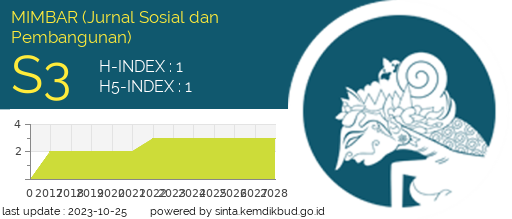A Phenomenological Study of Polemic Regulation of Abortion Law on Medical Emergency Indications in Hospital
DOI:
https://doi.org/10.29313/mimbar.v39i1.2082Keywords:
Phenomenology, Abortion Law, Medical Emergency, HospitalAbstract
Abortion is a crucial law in health law. But in reality, abortion with some medical reasons is a legal way to be taken in providing solutions to safety problems related to pregnancy. The polemic of overlapping legal rules that apply and occur between the Health Law and the Criminal Code is certainly a condition that must be addressed wisely through some analysis so that it is expected to find the best middle ground in addressing both matters. This study aims to determine the description of the implementation of abortion on indications of medical emergencies in hospitals associated with abortion law regulations namely the Criminal Code and the Health Act. The research design used in this study is qualitative with descriptive phenomenology approach. This study reveals a picture of the implementation of abortion arrangements based on aspects of medical emergencies that are connected between the Health Law and the Criminal Code regulation of abortion crime. The researcher analyzed the data using Colaizzi analysis, which completes the analysis by re-clarifying the participants. The results of the study found that legal issues regarding abortion regulations indicating medical emergencies as long as it refers to the procedure in accordance with Health Law No. 36 of 2009 then the legal issues regarding the Criminal Code on abortion can not be raised to the surface, because medically abortion provocatus medicinalis or abortion on indications of medical emergencies is an abortion that must be performed on pregnant women in emergency conditions that if not performed abortion can threaten the life of the pregnant woman.
References
Aroma Elmina Martha, Singgih Sulaksana. (2019). Legalisasi Aborsi. Jakarta : UII Press, hlm.18.
Cindy Oeliga Yensi Afita. (2020). Pengaturan Aborsi Dalam Perspektif Perundang-Undangan Indoenesia. Rio Law Jurnal. Vol.1, No.1-Feb 2020.
Clifford Andika Onibala. (2015). Tindakan Aborsi Yang Dilakukan Oleh Dokter Dengan Alasan Medis Menurut Undang-Undang Nomor 36 Tahun 2009. Jakarta : Jurnal Lex et Societatis : Vol. III/No. 4/Mei/2015
Erdianto Effendi. (2011). Hukum Pidana Suatu Pengantar. Bandung : Refika Aditama, hlm. 30.
Gracia Novena Maridjan. (2019). Aborsi Dalam Penerapan Hukum Pidana Di Indonesia. Lex Crimen Vol. VIII/No. 6/Jun/2019.
Harahap, M.Y. (2009). Pembahasan Permasalahan Dan Penerapan KUHP Penyidikan Dan Runtutan, Jakarta : Sinar Grafika, hlm. 52.
Kahar Maranjaya. (2020). Ketentuan Tentang Jeratan Hukum Terhadap Orang Maupun Fasilitas Pelayanan Kesehatan Menurut Undang-Undang Nomor 36 Tahun 2009 Tentang Kesehatan. Jurnal Medika Hutama. Vol. 01, No. 03, April 2020.
Khoirul Bariyyah dan Khairul Muttaqin. (2014). Legalisasi Aborsi dalam Perspektif Medis dan Yuridis. Pamekasan : Jurnal Al-Ihkam, Volume 11, No. 1, hlm. 2.
Meliza Cecillia Laduri. (2016). Penegakan Hukum Terhadap Tindakan Aborsi Menurut Undang-Undang Nomor 36 Tahun 2009. Lex Crimen Vol. V/No. 5/Jul/2016.
Mirza Maulana. (2010). Penyakit Kehamilan dan Pengobatannya. Jogjakarta : Katahati, hlm. 78.
Ni Putu Endrayani. I Gusti Ketut Ariawan. (2021). Kepastian Hukum Pengaturan Tindakan Aborsi Di Indonesia. Jurnal Kertha Semaya. Vol. 9, No. 8 Tahun 2021, Hlm. 1402-1411.
Polit, D. F., & Beck, C. T. (2014). Essentials of Nursing Research Seventh Edition Appraising Evidence for Nursing Practice. In Lippincott Williams & Wilkins
Priharto Adi. (2010). Kebijakan Formulasi Hukum Pidana Dalam Rangka Penanggulangan Tindak Pidana Malpraktik Kedokteran. Universitas Diponegoro, hlm. 32.
Riza Yuniar Sari. (2013). Aborsi Korban Perkosaan Perspektif Hukum Islam dan Hak Asasi Manusia. Sidoarjo : Jurnal Al-Hukama ; The Indonesian Journal of Islamic Family Law, Volume 03, hlm. 56.
Slamet Kurnia, Titon, (2007). Hak Atas Derajat Kesehatan Optimal Sebagai Hak Asasi Manusia Di Indonesia. Bandung : Alumni, hlm. 40
Supriadi.W.C. (2001). Hukum Kedokteran, Bandung : Mandar Maju, hlm. 25.
Tanti Kirana Utami & Aji Mulyana. (2015). Tanggung Jawab Dokter Dalam Melakukan Aborsi Tanpa Seijin Ibu Yang Mengandung Atau Keluarga Dalam Perspektif Hukum Positif Di Indonesia. Jurnal Mimbar Justitia. Vol. I No. 02 Edisi Juli-Desember 2015.
Yuke Novia Langie. (2014). Tinjauan Yuridis Atas Aborsi Di Indonesia. Jakarta : Jurnal Lex Et Societatis, Volume II, No. 7, hlm. 40.














